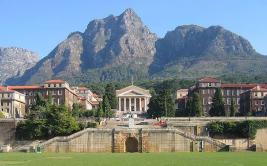
Jenna Etheridge
Cape Town – The terms of the final interdict granted against five people involved in UCT’s “Shackville” protest were too broad, the Supreme Court of Appeal (SCA) ruled on Thursday.
The SCA found the Western Cape High Court correctly granted the final interdict against Alexandria Gabriella Hotz, Masixole Mlandu, Chumani Maxwele, Slovo Magida, and Zola Shokane in May.
However, Judge Malcolm Wallis found the university was not entitled to such broad terms.
The final interdict barred the group from entering or remaining on UCT premises without prior written consent from the vice-chancellor or his delegate.
Wallis said the “core problem” was that it effectively excluded the group from the campus, which was traversed by public roads and constituted a public place.
That part of the interdict infringed their constitutional right to movement and freedom of association with others. It constituted a substantial intervention in their social lives. This term was removed.
Four other judges concurred with his ruling.
On February 15 this year, students erected a shack on a road on upper campus as a symbol of the struggle for student housing and financial exclusions. Security guards later demolished the shack.
The SCA found the five were all involved in erecting the structure. It found they were either involved in or party to the destruction, damage, or defacing of university property.
Vandalism
Various busts were spray-painted, a bakkie and bus were set alight, the vice-chancellor’s office was petrol-bombed, and various artworks destroyed on a burning pyre.
The court found the group did not see their actions as wrong and had not given any undertaking to refrain from doing it again.
Hotz, Mlandu, and Shokane were students at the time. Maxwele and Magida were former students.
The SCA upheld the terms of the final interdict that barred them from erecting any unauthorised structures; destroying, damaging or defacing any property; participating or inciting others to participate in unlawful conduct; and inciting violence.
Wallis said that in crafting a more narrow order, the five placed a number of conditions before the court.
They wanted all disciplinary proceedings against them to be dropped, and for an independent commission on student protests to be set up.
He said the court’s role in the appeal was to adjudicate a certain dispute, not to get involved in the legitimacy or merits of the ongoing student protests.
The court reiterated the right to peaceful protest, within the boundaries of the law and others’ rights.
Wallis said the history of civil obedience by leaders such as Mahatma Gandhi, Martin Luther King and Archbishop Emeritus Desmond Tutu, to name a few, was honourable.
“Civil obedience by these individuals was a challenge to an unjust or oppressive political and legal system, which is not present in our constitutional dispensation.”
He said students today had the guaranteed right to a peaceful protest, and could approach the courts with legitimate grievances against the university.
